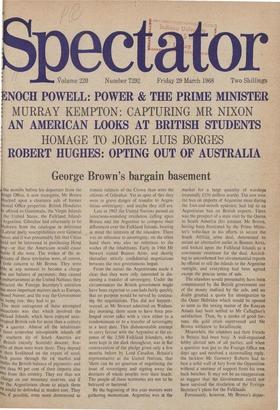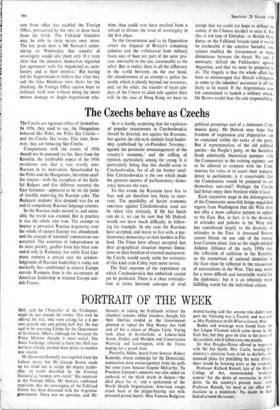George Brown's bargain basement
remain subjects of the Crown than were the citizens of Gibraltar. Yet in spite of this they were in grave danger of transfer to Argen- tinian sovereignty : and maybe they still are.
Late in 1965 the United Nations passed an innocuous-sounding resolution calling upon Britain and the Argentine to compose their differences over the Falkland Islands, bearing in mind the interests of the islanders. There was no reference to sovereignty; on the other hand there was also no reference to the wishes of the inhabitants. Early in 1966 Mr Stewart visited Buenos Aires, and shortly thereafter strictly confidential negotiations between the two governments began.
From the outset the Argentinians made it clear that they were only interested in dis- cussing a transfer of sovereignty. Under the circumstances the British government might have been expected to conclude fairly quickly that no purpose would be served by continu- ing the negotiations. This did not happen: instead, as Mr Stewart admitted on Wednes- day morning, there seem to have been pro- longed secret talks with a view either to a condominium or to a transfer of sovereignty at a later date. This dishonourable attempt to curry favour with the Argentine at the ex- pense of the 2,500 Falkland Islanders, who were kept in the dark throughout, was in flat contravention of the pledge given only a few months before by Lord Caradon, Britain's representative at the United Nations, that 'there can be no question of negotiating the issue of sovereignty and signing away the destinies of whole peoples over their heads. The people of these territories are not to be betrayed or bartered.' market for a large quantity of warships (reputedly £150 million worth). The row over the ban on imports of Argentine meat during the foot-and-mouth epidemic had led to an Argentinian ban on British exports. There was the prospect of a state visit by the Queen to South America this autumn. Mr Brown, having been frustrated by the Prime Minis- ter's volte-face in his efforts to secure the South African arms deal, determined to secure an alternative outlet in Buenos Aires. and looked upon the Falkland Islands as a convenient sweetener for the 'deal. Accord- ing to unconfirmed but circumstantial reports he offered to sell the islands to the Argentine outright, and everything had been agreed except the precise terms of sale. ture from office has enabled the Foreign Office, pressurised by the cno, to draw back from the brink. The Falkland Islanders may be able to sleep secure once more. The key point here is Mr Stewart's under- taking on Wednesday that transfer of sovereignty would take place only if it were clear that the islanders themselves regarded [an agreement with the Argentine] as satis- factory and in their interests.' But having led the Argentinians to believe that what they call the Islas Ma!divas were theirs for the plucking, the Foreign Office cannot hope to extricate itself now without doing far more serious damage to Anglo-Argentinian rela- tions than could ever have resulted from a refusal to discuss the issue of sovereignty in the first place.
To the Government and to its Opposition critics the disposal of Britain's remaining colonies and the withdrawal from military bases east of Suez are part of the same pro- cess, inevitable to the one, inexcusable to the other. But in reality there is all the difference in the world between, on the one hand, the abandonment of an attempt to police the world, which is plainly beyond our resources, and, on the other, the transfer of loyal sub- jects of the Crown to alien rule against their will. In the case of Hong Kong we have to accept that we could not hope to defend the colony if the Chinese decided to seize it. But this is not true of Gibraltar, or British Hon. duras, or the Falkland islands (and it would be intolerable if the selective Socialist con- science enabled the Government to make distinctions between the three). We can, if necessary, defend the Falklanders against Argentina, and that we must be prepared to do. The tragedy is that the whole affair has been so mismanaged that British willingness to come to the islanders' assistance is all too likely to be tested. If the Argentinians now felt constrained to launch a military attack, Mr Brown would bear the sole responsibility.







































